
Vol. 1, No. 20 Published by India China Division, Air Transport Command MAY 31, 1945
|
146 Points Are GI's Ticket to Happier Times of Attack On Pearl Harbor 1345 BU, China - High man on points for redeployment is Sgt. Billie B. Sutton, 25, a radio operator at 1343 BU. Sgt. Sutton leads the ICD with 146 points, most of them accrued in the Pacific in the early stages of the war. Sgt. Sutton, who arrived here in March as a radio operator, is no novice in the business of flying under adverse conditions. Shot down twice, a Jap prisoner for five days, forced to ditch in the Coral Sea, and to crash land on another occasion after being badly shot up - he has been through them all. Seven Years' Service When Sgt. Sutton, whose wife and two children live in Salt Lake City, went on a raid over New Guinea early in 1942, his Fortress was shot down, the pilot and waist gunner killed in the air. The remainder of the crew bailed out and walked through jungles for six weeks before reaching Port Moresby. A veteran of seven years service, Sutton joined the Army in 1938, and went to Clark Field, the Philippines, in 1940. He was serving with the 19th Bombardment Group when the war broke out. In a raid on enemy shipping off Luzon he was shot down for the first time and captured by the Japs. Leaves On Last Plane After five days imprisonment during which the Japanese were too busy to bother them, Sutton and the plane's engineer escaped, aided by Philippine guerillas. rejoining his outfit he was awarded the Silver Star and Purple Heart for action and wounds received in the raid. Soon after his escape, Sutton left the Philippines on the then last B-17 to get out. (Later an abandoned Fortress patched up by a mechanic was flown out). Sutton received his second wound on a raid over Buna, when his unescorted bomber was jumped by 15 Jap fighters. Fighting a running battle for an hour and 45 minutes, the hard-pressed crew shot down eight Japs and had two engines shot out, the ball turret shot off, and six crew members wounded. They limped back home to belly-land owing to damage done by 11 hits from 20mm cannon fire, and found over 3,000 holes in the battered Fortress. Sutton was awarded Oak Leaf Clusters to his DFC and Purple Heart for his participation in the flight. He shot down one of the eight Japs, and has a total of seven enemy aircraft to his credit. In December, 1942, the 160 surviving members of the 19th were sent back to the States. Sutton was hospitalized for a year, recovering from complications of his back wounds and from recurrent malaria. He spent another year as an instructor at Pyote, Texas, before being reassigned to overseas duty. His decorations include the Air Medal with ten clusters, the DFC with one cluster, Purple Heart with one cluster, Silver Star with one cluster, and Presidential Citation with three clusters. He had seven battle stars on his Asiatic-Pacific ribbon before coming to China. |
CAUSES DEATH, INJURIES
TO INDIANS, AMERICANS
Sergeant's Quick Action Saved Comrades' Lives
As Storm Hurled Metal Roofing Through Truck
1347 BU, India - Striking with full fury, a tornado swept by this base last week, doing only slight damage to the airfield, but causing death and destruction at the nearby ASC installations.
Damage at the airbase was confined to uprooted trees and wrecked bashas. ASC's warehouses and other buildings were hit hardest. Several storehouses collapsed burying coolies. Sheets of corrugated steel, swept into the air by the high winds, killed seven Indians.
Bouffard Saves Lives
The hero of the storm was M/Sgt. Roger Bouffard, provost marshal section, who, through his cool thinking and fast action, saved the lives of two GIs and a local guard.
Sgt. Bouffard was driving toward town in a weapons carrier with two enlisted men and the Gurkha, when he found himself directly in the path of the approaching tornado. Trapped on the rain-soaked, slippery road, he backed his truck against a tree to keep it from turning over, then coolly shoved the frightened passengers into a nearby ditch.
Saw Indian Hit
A moment later he jumped down beside them as the tornado shattered the windshield and hurled a large sheet of steel roofing across the front seat. The jagged length of metal sailed through to the rear of the truck. Observers who saw the wreckage asserted that it would have killed the passengers had they remained in the vehicle.
"I really didn't know what I was doing," Bouffard confessed later, shaking over a cigaret. "But the one sight I'll never forget was when an Indian yelled 'Oh, sahib' to me just as a chunk of steel tore into his chest."
Meanwhile within 50 feet of the wrecked truck, four coolies and an Indian soldier had been killed in the barrage of windborne trees and rocks. Seven additional bodies were dug out of the debris and fallen warehouses.
At the scene of death and destruction Capt. Warren Colton and a crew of GI medics, including Cpl. William Forgan, Sgt. Albert Bradinini, Pfcs. Verne Ayer and James Burns, gave spot first aid and treatment for shock,
|
Col. E. A. Abbey, visiting division surgeon, himself shaken, took five stitches in the upper lip of Maj. J. J. Cleveland, base flight surgeon, one of the few Americans hurt. Then Maj. Cleveland and Col. Abbey rounded up all medics for the tremendous task ahead. Picked men from the steady stream of volunteers performed secondary but important tasks, holding floodlights in position, assisting in transmission of blood plasma and sterilizing instruments.
Maj. Charles Montgomery, aided by Sgt. Oliver Swanson and Cpl. Harry Hooper, medical technicians, fought vainly for hours to save the life of an Indian whose neck had been almost severed by flying debris. Capt. N. O. Williams and Sgt. Paul Hecht set a compound leg fracture for another Indian who superstitiously refused anesthesia. Sgt. Leo Manes took over a small corner of the crowded dispensary to treat gashes and gaping cuts, while Col. Abbey, on a busman's holiday, performed hurried emergency surgeries.
Too Scared To Move
Pfcs. Richard Bell and John Boswell, MPs whose lives Bouffard had saved, when treated for shock and minor bruises, had nothing but praise for the sergeant's quick thinking.
"I know I was too scared to move," Pfc. Boswell said. "I've been through two others like this back in Kansas and I thought I was really getting it this time."
Pfc. Bell, who got away with a cut heel and a slight shoulder wound, was equally grateful.
"Guess I was mighty lucky to come out so easy," he grinned.
Pvt. Earl Heck, base aircraft refueling section, who had been working in the warehouse area, was a witness when the tornado swirled overhead.
Visibly shaken when interrogated, he stated: "It seemed like wind was rushing from every direction, meeting finally above the storehouses. The whole thing couldn't have lasted more than three minutes, but they were the longest minutes of my life."
Col. Abbey praised the work of this station, stating that "the excellent organization made possible the saving of many lives which might have been lost."
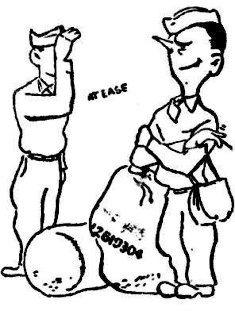 Passes For One of Gentry Due to Majestic Bearing
Passes For One of Gentry Due to Majestic Bearing
1345 BU, India - Behind the mail wicket, dispensing his daily ration of literary cheer, lurks the only minor "major" in ICD.
Few people who approach these portals know his real name. They only see a heavy - one might say pachydermous - middle-aged man wearing shorts and a T-shirt.
The rank of major was bestowed upon Pfc. Adam Edward Pejkowski back in the dark recesses of his basic training day because of his imposing, majestic demeanor, mien and appearance. He has borne the title throughout his military career.
Upon his arrival at this base one dark and stormy night the "major" and his fellow newcomers were standing in front of the P & T building when a young second lieutenant approached the group. Asking who was in charge of the group, the officer was referred to "major" who was carrying the orders.
In the darkness, the lieutenant approached "major" and throwing him a snappy, straight-out-of-OCS highball, asked him if he were in charge.
"Well," said 'major,' "you might say I am."
Approaching the staff car usually reserved for VIPs, the glare of the headlights failed to reveal any gold leaf on "major's" collar.
Observing this, the lieutenant pointedly remarked, "By the way, sir, what is your name?"
"Pfc. Adam Edward Pejkowski, sir," replied "major" a trifle abashed.
Now the lieutenant carries a flashlight when meeting planes after dark.
Tells of Bargain-Counter Intelligence Job by Nips
1303 BU, Agra - S/Sgt. Gene Gauss of Chicago doesn't think that Jap spies are always quite as smart as they might be.
Gauss is telling one of the "now it can be told" variety concerning a brush he had with a couple of Nip secret agents back in August, 1944, at an Assam station which received evacuees from Myitkyina, just when it was being recaptured.
Sgt. Gauss, with an officer and another enlisted man, was named a member of a group assigned to act as custodians for four Burmese, clad in rags and emaciated from malnutrition suffered in Jap prison camps.
When the group of three met the incoming plane carrying the four Burmese, there were two additional passengers aboard. They had climbed on at "Mitch" and clamored to be taken along, and since there was no time for argument, the pilots had given them the nod.
The welcoming party took the new arrivals to an ARC bungalow where intelligence personnel waited to question them.
The four Burmese got by okay, but the two uninvited guests came in for some rough questioning. How had they got to Myitkyina? They had walked from Rangoon, they claimed. Where had they got the khaki clothes they were wearing? At a black market in Rangoon.
They were turned over to British field security authorities, and found to be spies.
S/Sgt. Gauss always figured they would have been smarter to have dirtied up the khakis a bit instead of making their dramatic appearance in Assam spotlessly clean, crisp and natty.
All of which has given the sergeant a rough idea that the Nip isn't always quite on the ball, and inclined him to share the viewpoint of GIs who take a faint view of the Honorable Enemy.
|
By Appeal to Honor
1333 BU, Assam - On how Sgt. Ashley Hale, Dean of Renshaw University here, got his watch back.
"Lost, in the squadron washroom yesterday, a waterproof Frey watch with a metal band. Some thoughtful friend of mine picked it up where I had left it to prevent some unscrupulous person from stealing it. This watch is not a family heirloom, it has no sentimental value, it was not given to me by my grandfather on his deathbed. It's just a $23.85 PX watch that gains three minutes every day and needs oiling. But it's the only watch I've got! Without it, I don't know the right time. I believe in the essential integrity and honesty of the enlisted man, so I'm sure this watch will show up in three days. If it doesn't, I'm putting in for OCS. Will the finder indicate below what action I should take?
Your watch is in the orderly room.
Keep your shirt on - I'm returning it tomorrow. TS.
Hale got his watch back the next morning.
Chaplain to the Rescue, Transports the Inspector
1350 BU, Kunming - When the air inspector here made the weighty decision to conduct a routine inspection of the various installations on the base he tried in vain to get transportation. After many trials and errors of a nature usually peculiar to EM, he was given a bicycle - by the chaplain. It carries a sign, "Air Inspector." Whether it is equipped with a punch for the TS card is not stated.
Tech Inspector Meets Death by Electrocution
Damp Hands and Clothes, Hot Wire are Fatal Combination
1340 BU, Kunming - Sgt. George Aceveto, Brooklyn, N.Y., was killed recently through an unfortunate series of mistakes.
Aceveto, who was a technical inspector at this base, had been washing his clothes and went outside to hang them to dry. There was a line hanging alongside the barracks at just the right height and this was just the thing for a clothes line.
Earlier in the day a pole, carrying a line of 220 volts, had tipped over. Because of the heavy wire, the rain-softened earth and the absence of support wires, the pole started leaning towards the barracks, dropping the line to shoulder height. This was Aceveto's clothes line.
The ground was wet, so were the clothes and the sergeant's hands. It was a perfect set-up for an electrocution, with death as the result.
M/Sgt. Elmer J. Warren, 1350 BU air inspector, Berlin, Md., heard Aceveto's screams and rushed to the scene. He applied artificial respiration until the medical officer arrived. Everything possible was done but the shock had been too great. Sgt. Aceveto died about a half an hour later.
According to Sgt. Kenneth W. Griffin, Washington, D.C., a refueling man with the 1340 BU, the victim had had several years electrical experience in civilian life plus work in the Army. Griffin said Aceveto was the type of man who would take every precaution to prevent an accident and had probably thought the wire was a new clothes line just hung that morning.
|
Pioneer Mock-up of Skymaster
Marks Advance in Repair Work
As Sequel of Revetment Crash
Brake Failure Washes It Out
1345 BU, India - A serious ground accident is being given a happy ending here where ICD and ASC engineers are using a damaged plane to create the first C-54 mockup in ICD.
The Skymaster cracked up here recently when a brake gave way causing it to plough into a revetment. Since certain parts, including a right outboard wing panel and wing spar, could not be replaced immediately, ASC officers advised that repair of the ship was not practicable.
The plane was turned over to Lt. Kenneth teeter, aircraft maintenance and engineering officer who was assigned the task of making the mock-up. A special hangar is being built for the C-54 here and upon completion of the mock-up a giant schoolroom will be opened. Mechanics from other bases will be brought in for courses which, according to Lt. teeter, will last from 20 to 60 days.
It is also expected that C-54 pilots will be given a similar course to acquaint them better with the mechanics of their aircraft.
Chinaside Scribe Posts Bucks Fifty for Photo Winners
1350 BU, Kunming - A photo contest, open to all personnel of the China wing, is being conducted by the wing public relations office with prize money furnished by war correspondent Cecil Dickson, chief of the Gannett Newspaper Chain service.
The three prizes offered are a $25 war bond for the best picture, a $15 bond for second and a $10 bond for third.
Winners will be judged for the most beautiful scenic or picturesque photo and another showing the best action. All contestants must enter both a scenic shot and an action shot.
All entries should be cleared through the public relations officer of each base. He will in turn mail them to wing PRO. Each photographer, amateur or professional, may submit as many pictures as he desires.
|
ICD's Manifold Activities
Hq., Calcutta - A homegrown moving picture which tells the story of ICD has been completed and is now being processed in the U.S. prior to release.
The celluloid story of the division is to be shown at Karachi to incoming personnel as part of their indoctrination process. Later on it is planned to release the film to other stations throughout the I-B and China Theaters.
The picture, as yet unnamed, was filmed in every part of the ICD to show the overall operation. Lt. Don Downie, veteran Hump pilot and Cpl. Ted Schoening, former writer for Paramount and Universal Studios in Hollywood, scripted the movie. The camera work was done by Lt. Charles Hockman and Pfc. Marshall Allred, of the 10th Combat Camera unit.
Flying 10,000 miles to cover the movie story, the crew took shots of the Hump operation, jungle indoctrination, flight transition, fleet service, turnaround operation, Chinese troop Movement and search and rescue.
In its final form the picture will run about 35 minutes.
Predatory Crow in Dive-bomb Assault Siezes Golf Ball
Hq., Calcutta - Capt. Irving Harned, S & S, believes there should be a bounty on crows.
The other day, rounding the links near Calcutta, Capt. Harned produced a shiny new Stateside golf ball his wife had sent him by special courier. He set it up, teed off and swung - and smack down the middle of the fairway it went.
It was a long drive and everything was rosy - until Capt. Harned got within 15 feet of the ball, when there was a sudden swish of wings, a black object shot in front of him and there wasn't any golf ball.
"Oh, well," mused the irate captain after he shook his fist at the crow, "I hope it was a female and she tries to hatch the golf ball."
Liquid Gold Given as First Prize for Naming Stage Show
1340 BU, Kunming - When V-E Day rolled around, Pfc. William R. Pfarr, special service projectionist here, had quite a celebration - on a donation by Col. J. I. Teague, division director of personnel.
Pfarr was the winner of the division-sponsored contest to name the ATC stage shows that tour China. He suggested the name "Skyline Caravan" which clicked with the judges in Calcutta and won Col. Teague's valued prize.
Then one evening when Pfarr was in the audience awaiting the beginning of ATC Show Unit No. 8, two GIs with pistols came staggering onto the stage with an enormous safe. They were fellowed by a steel-helmeted soldier with carbine held ready.
The announcement naming Pfarr as winner of the contest was read and the safe opened. Out came a bottle of Vat 69, the grand prize. Pfarr accepted the bottle amidst the envious applause of the audience which eventually quieted down after the first sight of such a rare commodity in many months.
Until V-E Day, the date scheduled for the bottle's opening, his bunk became a popular place.
Ye Olde Ingenuity Generates Mongrel in Form of Truck
1340 BU, Kunming - It's a sad looking truck, but at least the boys that built it aren't walking anymore. When T/Sgt. William L. Ruesch, Berwyn, Ill., S/Sgt. Lewis Rice, Concord, New Hampshire, S/Sgt. Wayne L. Donaldson, Oelwein, Iowa and Pfc. Henry E. Ellis, Alton, Ill., decided they needed some kind of transportation they
|
The repairing and cleaning of the parts, the breaking down of the three trucks for the essential units and the final assembly took them two weeks of working at night in their spare time.
Boasting a Chevrolet nose, a Ford chassis and a General Motors cab, it has a high-pitched horn that is familiar to all the GIs around here. The fellows claim it is more economical on oil and gas than a jeep.
Lt. John Kinder, recently transferred boss of theirs, was also one of the willing workers and many an evening he would don an old pair of overalls and clamber down into the grease pit to pitch into the job.
1327 Carnival is Gala Event
Crowds Watch Field Events, Throng Concession Booths
1327 BU, Assam - In the offing for nearly a month, a carnival and field day was held which dwarfed any festive events ever conceived here before.
From three p.m., when the carnival was officially opened with a band concert by the 28-piece ATC outfit stationed at the nearby 1328 BU, until well past dark, when the last roast pork sandwich and bottle of iced beer was exhausted, the hilarity roared unchecked.
Crowds, estimated upwards of 1500 thronged around the concession booths all afternoon, risking rupees on roulette and all the usual sideshow gambling booths.
Field events, in which all squadrons participated, featured all the old gag races, winners of which were all rewarded with silver cups. When the scores were totaled the Negro entry walked of with the high award.
Prior to the carnival the countryside had been scoured for food.
Darkness did not still the holiday fever. "Humpsie Daisy," an all-soldier stage show hit the boards as an appropriate end to the field day.
Finds Answer for Mail Frustration
1306 BU, India - A new twist has been added to mail call here, eliminating the frustration of inquiring after mail when none has come in.
Now when letters or packages arrive, special flags are run up on a pole in front of the administration building. One of the banners has "MC" lettered in orange against a black background and indicates the arrival of Stateside mail. The second flag with the letters in black on an orange field announce that theater mail is ready for delivery.
Fire-Fighting Truck Built by 1306 Men
1306 BU, Karachi - As a result of the combined efforts of two Los Angeles GIs, this base's fire station has a unique fire truck that, as far as is known, is entirely new to this theater.
A converted weapons carrier, the fire truck has been designed by Sgt. Jack Rein and Cpl. Seymour D. Holtz to cover the roadless territory where it is sometimes impossible to take a heavier truck.
The "fire-fighterette" is equipped with buckets, gunnysacks, first aid kits and four 50-pound cylinders of carbon dioxide. A radio now being installed will provide quick communication with the tower.
|
500 Watch Final Proof That Yanks
Are Mad in Head: Mounted Baseball
1306 BU, Karachi - Astounded Britishers, awed Indians and hilarious GIs, comprising a crowd of 500, watched a picked team of officers fall victim to a team of EM in a donkey baseball game here. All went away agreeing that Americans are . . . well, eccentric to say the least.
Brandishing a sawed-off baseball bat, Chaplain Joseph J. Sullivan explained the rules. "Only the pitcher, catcher and batter will be permitted to dismount. When the batter hits a fair ball, he will mount, and head for first base. Gentlemen (or EM, as the case may be) of the infield and outfield will field the ball from their mounts only . . . and the decision of the umpire will be final!"
Leading off for the officers were Col. Russell Munson, Lt. Col. Harvey Miller and Lt. Col. Calvin Ledbetter, who were retired in short order. Protesting that their donkeys were not equipped with any sort of navigation instruments or bridles, they were invited by the arbiter to take their troubles to the chaplain.
A Love Affair
All batters managed to belt the apple into ordinarily safe territory, but mounts on the outer ramparts were somewhat more interested in their work than were those traveling the bases.
Col. Munson took the mound for the officers but bowed out to CWO Howard Bossert when the EM filled the bases.
A love affair between two trusty steeds on third base developed, and while sex reared its ugly head, Maj. Ben Adams galloped in from right field to cut a run off at the plate.
Highlights of the game included "run downs" between bases that developed into cross country excursions as the mounts ignored the bellows of their riders and left for greener pastures. Mr. Bossert fell off his mount twice while going after a hot one.
As the contest entered the last stanzas the officers frantically regrouped and redeployed their forces but still failed to overcome the hitless twirling of Sgt. Carl Johnson. An entire new officer team was fielded but the EM were not to be denied.
The only run of the game crossed the plate in the last of the fourth inning and the EM won, 1 to 0. As donkeys and players ambled off the field watching GIs were seen to shake their heads sadly and join the British and Indians in murmurs of " . . . eccentric, these Americans, eccentric indeed."
News Flashed To Hump Fliers During Walkout
L-5 Drops Walkie-Talkie to Establish Contact with Party
1326 BU, India - Despite a plane crash which isolated them for three weeks in the dangerous Naga head-hunting country, four ICD fliers kept close tabs on the world news.
Radio communication was established with the lost airmen, Lt. Jimmie Fields, pilot, F/O Steve Magdich, co-pilot, Sgt. Wayne Randall, radio operator and Sgt. Charles Woody, engineer, on the 15th day after their C-46 cracked up. A walkie-talkie was dropped to them from an L-5 and Randall began operating the set.
Head Hunters Co-operate
First news flashed to the stranded crew was of the death of President Roosevelt. As they rested from their hike back to civilization they continued to hear news broadcasts about the "outside world."
Aided by local guides, the fliers toiled over narrow hill paths, subsisting on eggs and rice at Naga villages where they holed up at night. The itinerary called for a route passing through one village a day. Never noted for either hospitality or sanitation, the Naga head-hunters were nevertheless co-operative, according to crew members, who gave them much of the credit for saving their lives.
Co-pilot Led Way
Lt. Fields suffered from shock and was stricken with fever. Both enlisted men were uninjured, but F/O Magdich sustained a fractured right arm. During part of the walkout it was necessary to carry the pilot on an improvised litter. With his arm in an emergency splint, F/O Magdich led the little band. A search and rescue plane from the 1333 BU located the lost fliers.
|
Employ Seahorses, Evinrudes
To Supplement Supply Routes
Bucking River Currents in Combat Area
With a Chinese Combat Command in Hunan Province, China - When the river traffic in this combat area grew too clogged and lethargic to accommodate the fast moving forces, the U.S. Army commanding officer sent out a call for out-board motors. Since many roads are impassable and some airstrips are almost inaccessible, the rivers and waterways play an important part in waging war in the forward areas.
ICD planes flew the out-board motors into a nearby airstrip. They brought in every available putt-putt from Johnson Seahorses to Evinrude Evcos and turned them over to a handful of GIs, old-timers who had been in Myitkyina, on the Burma Road and other points of hot operation. Soon the boys had the motors hooked up to the river craft and 15 sampans and two 10-ton junks were putting through the water on two of the nearby rivers.
Chinese navigators are used to guide the craft through the tricky waters with its whirlpools, rapids and boulders. Sitting in the bow of the mechanized junks the coolies signal and wave the GI commodores through the dangerous waters.
When the China sky goes nuts and drops a cloud burst on the boys of the unique Hunan fleet, it takes courage and skill to handle the boats as they plow through the boiling water. Ten tons of cargo in a junk on a river gone rampant is no joke.
Billet After Billet Collapses at 1305 As Cyclones Rage
1305 BU, Calcutta - Apparently when buildings start falling around this installation, the elements are never satisfied with just one, two or even three buildings.
First, "Teek Hai" college hit the dirt, then a short time later, the same building collapsed again. Next, one of the hangars toppled and shortly after that the roof blew off of two more buildings. Now, the latest "blow-out" of 1305 is the transient billet dayroom, which fell last week during a 70-mile gale that raged through this area.
Although there were eight persons trapped within the dayroom when the storm struck, all were able to get free without suffering serious injury. Two were pinned beneath the extreme end of the room where they were helpless for approximately 30 minutes before they could be extricated.
Huge Truck Convoy Leaves Assam Base On Way to Kunming
1333 BU, Assam - The largest convoy of trucks and heavy equipment with personnel from every base of the Assam and Bengal wings began its journey from Assam to Kunming last week.
The vehicles, covering a distance of seven miles from end to end, consist of 6x6 cargo trucks loaded with gasoline and oil, weapons carriers with supplies and rations, jeeps, wreckers, ambulances and trailers to be delivered to China bases upon arrival.
Briefed on Hazards
Convoy Commander, Capt. Edwin C. Frost, Seattle, Wash., ordnance officer here, assembled and organized the personnel - all volunteers - at the staging area. In briefing the drivers, he warned of the hazards to be encountered enroute and stressed the importance of strict discipline and utmost caution throughout the journey of 1150 miles along the narrow, winding trails of the Stilwell Road.
Cletrac Goes Over
Included in the cargo are 12 tons of 10-in-1 combat rations, the same rations used for the invasion of France on D-Day. One out of every three vehicles in the convoy carries the gasoline and oil which will be used for servicing and refueling. The remainder of the cargo, filling more than 100 vehicles and trailers, consists of airplane tires and other heavy equipment items.
Of special interest was the inclusion of a seven-ton cletrac tractor in the convoy. It is believed that this is the first time this type of equipment has been convoyed over the Stilwell Road.
Life in Southwest Pacific Rugged, Says Columnist
By Art Veysey
Editor's note: This article was written for Hump Express by Art Veysey, correspondent for the Chicago Tribune who has been covering the war in the Philippines. After a short stopover in the India-Burma and China Theaters he will return to the Pacific.
There is some talk among ICD personnel in the IB and C theaters wishing they were in the Philippines. Life there, they say, must be good.
Such reports are untrue. Life in the Philippines is very rugged. Let me cite you just one example.
The time was early in February. The 37th Division infantrymen, after marching and fighting for three weeks through the 100 miles from their Lingayen Gulf beachhead, were about to enter Manila.
Stopped at Bridge
It was eight in the morning when the scouts, the general, and the press who made up the point, reached the last river. Just beyond rose Manila.
The Japs had been at the river the night before but they had pulled out before dawn. Their last act was to blow up the only bridge. They did a very efficient job. It would be at least a day before our engineers could throw across a span that would permit vehicles to pass.
Business was Good
In best fashion, the troops fanned out up and down the river hunting a crossing. And there, just to the right of the highway, rose a big building. It was the BBB Brewery, one of the biggest structures of its kind in the Far East.
The troops, being well trained, scouted the building. They found it full of booty. Cases and cases of booty. It was immediately disposed of to prevent its falling into the hands of the enemy again in case of counter attack.
As soon as the engineers arrived they checked the brewery, discovered it had been operating up to the previous nightfall, and found the vats full. Thousands and thousands of gallons, all ice-cold. In almost no time - everyone knows the speed with which Army engineers operate - they had found the spigots and opened them.
Soldiers flocked into the plant with five gallon cans, with helmets, with anything else that could hold the ice-cold booty. It flowed from so many spigots that when men came out they were soaked with it. It was their first shower in weeks.
What's so difficult about life in the Philippines? Listen, did you ever try to tell the difference between suds from beer and suds from soap?
|
1328 BU Personnel
Earn Commendation
In Pipe Movement
1326 BU, India - Completion of the moving of pipe from a temporary operating base to forward areas in record-breaking time won for the personnel here a commendation from Brig. Gen. Tunner.
The project was completed two weeks under the longest estimated time due to the fact that an average of over 30 daily trips during the first three weeks was boosted to 55 per day toward the end of the schedule.
The ICD CG said " . . . operating into fields not designed for transport operations, with crews not previously qualified in Hump operations, and flown from a temporary operating location, the project was successfully accomplished through the wholehearted efforts of all concerned . . . "
Clerks on the Ball, Fritz Tests Prove
1328 BU, Assam - "What every Army clerk should know" is the subject of a test being given all desk wallahs here.
Of the 78 men examined thus far, 51 attained grades above 90 while only one failure was reported. The tests were devised by T/Sgt. Edward Fritz.
In order to acquaint clerks thoroughly with Army correspondence, the sergeant had previously assembled a manual on that subject.
Real Rotator
1330 BU, Assam - Sgt. S. A. Frederick is the man to see at this base if you want to learn anything about rotation. A ,long time ago he came here, flew his time as a radio operator and rotated back to the U.S. After a few months at Shangri-La bases, he shipped overseas again. His plane circled the field one morning and there he was - back at 1330. Besides all his adventures in ICD, Frederick did a little time in the European Theater.
 Memorial Day - 1945
Memorial Day - 1945
Yesterday was Memorial Day... the day set aside by America to honor its war dead.
The day became a national observance after the Civil War. It honors, however, the dead of all American wars.
It cannot be said that Memorial Day went unnoticed in CBI, for Army chaplains paid brief homage in church services, but there was no general observance as is customary in peace time and at home.
Men in this theater were too busy, too concerned with what the future portends in the final great drive against Japan to devote more than a few moments of thought to Memorial Day.
This year Memorial Day was marked not by somber memories of a war 25 years ago, but by a great sense of pride that American armies had so decisively helped crush the Nazis from the face of the earth; by a renewed determination that, cost what it would, American armies would, with awesome finality, likewise obliterate the Jap as a military power, combined with the deep grief of personal loss which has gradually pervaded America and over to its smallest village, as the casualty lists swelled from coast to coast.
Further, more than 5,000,000 Americans, serving overseas; in Europe, the Southwest Pacific and CBI, will return when the war is over with a personal feeling towards Memorial Day which time will never erase.
These are the men who have seen their comrades (their tent-mate, the guys who had shared their beer, the fellas who had shared the last cigaret) blown to pieces. To them, Memorial Day will mean guys like that; Ed, Bill, and Joe, who didn't come through with them, but who died for them in the bloody hell that is war in a foreign land far from home where even the blessing of dying on native soil is stripped from death.
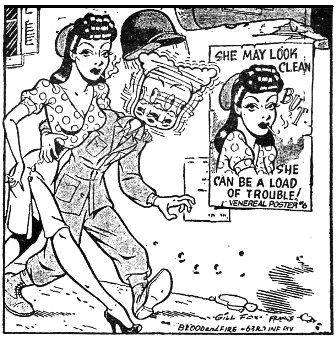
|
It seems that Snoop and Peek, famous Japanese spy team, are active in these theaters. Every day they turn up with some facts that even we didn't know. One phase of their SOP seems to be gathering information and sending it back to Tokyo Rose for use on her radio machine.
One of the best stories of how Rosie operates is about her greeting the B-29 boys. The day the first Superforts arrived at their bases in India, old Rosita greeted the fellows with her customary accented-slang and began to read off the names of the pilots, the serial numbers of the planes. She concluded the little broadcast with the old warning - "and watch out boys, because we're going to come over and bomb your field..." Everyone knows that the 29 movement was "super" top-secret.
Those names and plane numbers leaked out somehow, probably because some knucklehead was a little carefree with his talk or a little careless with the secret papers that should have been in a safe instead of a hip pocket. The same thing is happening to a smaller extent, throughout the division.
Sometimes these local laborers that work around the bases can understand more of the English language than they pretend. And even an illiterate can stoop over to pick up a piece of paper with figures or facts on it. It makes their hearts jump with joy to listen in on some GIs talking over the next flights, the new fields or the number of trips that were made in the last week.
It's best to watch that stuff, and curb the talk when there is any personnel around that shouldn't be in the know. Loose talk today may cause a loose nut tomorrow. And it would be kind of hard to take if you had to realize that the bed next to yours was empty because your tongue wagged a little bit too much.
Humpex Cartoonist Is Old Seymour Johnson Character
Private John Babnis, the creator of the paranoid pair known as "Teek and Hi," and Hump Express' consistent contributor since its second issue, has gone to China. So "Teek and Hi" have now become "Ding and How." They continue to appear in their usual spot on the editorial page (above).
Babnis is no newcomer to cartooning, nor to Army cartooning. For about 22 months he drew the feature "This Is The Old Army," which appeared regularly in Aer-O-Mac, the camp newspaper published at Seymour Johnson Field in Goldsborough, N.C. Another brain-child of his Uncle Sugar days was "It Happens Always," a full-page deal.
Started In School
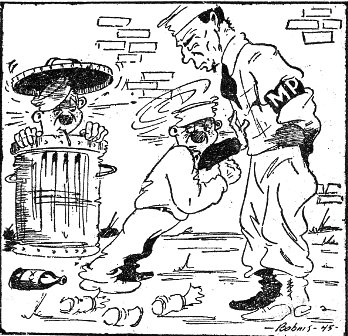 "His terms are - unconditional surrender."
"His terms are - unconditional surrender."
|
Just before coming Snakeside, he was with Training and Visual Aids at Greensboro.
Babnis' talent was first noted by a grade school teacher, who made arrangements for him to study under two accomplished cartoonists, A. A. Walsh and M. A. K. Feldsberg. He also studied landscape and other painting during his pre-Army career, but the cartoon medium has always remained his primary concern.
Inspiration for the doings of "Teek and Hi" came to Babnis, it was said, from two of his basha buddies in upper Assam, Pvt. John J. Culp and Pvt. Billy O'Trusty, many of whose real life antics found their counterparts in the ink as weird escapades of the insane twins. How he will fare without this constant source of inspiration remains to be seen, but he has not expressed any qualms at the prospect, and his adherents are counting on him to "carry on" from over the rockpile.
Draws In His Basha
Babnis has always preferred to work in his basha rather than in any office, and all the "Teek and Hi" cartoons were drawn there. It is in the basha, he maintains, that an observer can best capture the flavor of GI life in Asia. As a further guarantee of verisimilitude he passes the drawings around among a few dogfaces and invites their opinions before sending his contributions in for publication.
Laundry at 1328th to Keep Pants On
1328 BU, Assam - Monsoon rains won't catch GIs with their pants down and on the clothes line here this year.
Two new heaters were installed this week to guarantee dry clothes in the wettest of weather. Other recently installed innovations at the laundry are the button and rip-sewing service and a new Stateside washer.
Sgt. Joseph C. Kocis, serves under Lt. J. W. Ryan as NCOIC. Maintenance troubleshooter is S/Sgt. William Russell.
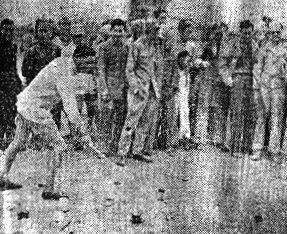 Toss the hoops and win a prize. Just as in the fairs back home, the most popular concessions on the midway are
the games of chance. Here, too, it's a mystery how the proprietor always comes out ahead - but he does.
Toss the hoops and win a prize. Just as in the fairs back home, the most popular concessions on the midway are
the games of chance. Here, too, it's a mystery how the proprietor always comes out ahead - but he does.
|
Annual Fete Visited by Thousands
By Cpl. Tom Farnsworth
1338 BU, China - GIs from this China base left their American oasis to catch qualities of concentrated Chinese atmosphere at the annual Tall festival which lasted five days this year.
The fair is held just outside the ancient city of Tali, at the base of towering Mt. Tali, friendly landmark to Hump jumpers, but also a grim pinnacle which has claimed several storm-beaten transports since ICD's pioneering days.
Tibetan Nomads Attend Festival
The narrow stone road leading from Tali to the grounds is lined with small assortments of goods spread on the ground. Some are there to avoid paying for an inside concession and some to catch the easy spender before he reaches the varied displays on the fairground. Beggars too, line the road, but they number no more than ten or a dozen.
Along this approach to the fair are the Tibetan nomads who attend the festival in slowly but steadily decreasing numbers.
In olden days the fair was an important occasion in the economy of this part of China. Nomads from Tibet made the eight to ten-week trip to sell their medicines and mules for money which they used to buy green tea in the southwestern part of Yunnan province. The Tibetan plateau is too cold for even these rugged tribesmen during the midwinter. They spend the worst months on the eastern reaches of the mountain table. As soon as the passes are clear they start the journey down the Salween and Mekong valleys then cross the last high range of mountains to Tali in April.
Tibetan mules are valued but the most important articles the tribesmen bring to trade are their
|
The Tibetan men wear soft skin boots with intricate woven designs while the women go barefoot. The men wear high hats of skin or felt. Women go hatless for the most part or wear casually but firmly fixed turbans. Their hair is often piled high and decorated with large bones or silverware. Many women wear long, pendulous earrings, some of one piece, others of large, stringed beads, bones, or carved wood. Decorations are carried to every extreme with three large silver rings on each hand being far from uncommon.
Tibetans and the few beggars were the only real travelers attending this year's fair. In former years the festival attracted visitors from as far away as Peking but such travel is impossible during the war.
For days preceding the fair, however, Chinese had been drifting in from the surrounding country and as the opening day neared they formed steady files on the roads leading to Tali. Only here and there along the route were the independent Tibetans, with a minimum of equipment on their pack horses and occasionally accompanied by huge ferocious dogs.
Room for Gamblers Too
In contrast to the lack of order outside the fairgrounds, the concessions inside were laid out in neat rows - replicas of Stateside fairs except that the booths were simple affairs of cloth and poles.
Some of the grounds were divided into sections, the two biggest being occupied by cloth dealers and those who sold roots, herbs, grain and fruit. There were quantities of dried orange peeling for sale.
For gamblers - ever-present - there was a pitch-a-loop game. Another attraction was a small, weather-beaten portable "picture show." For 100 CN fair-goers looked through a hole at a short series of paintings of historical or romantic events while the proprietor beat a tiny drum with cymbal and chanted the story. On the fourth day of the fair a horse race was the main event. By American standards the festival was short on entertainment for these few items made it up.
Plenty of Junk Available
One tent housed nothing but a table of common sewing needles which surprised many GIs who remembered an almost complete lack of this item in the States for the past two years. Booths of cloths were numerous but their imitation silk goods could be matched in any Chinese city.
"If you want it, he's got it," was the GI comment on the several different displays of junk. Just junk to most Americans, but the tin cans, iron pins and nails, pots and pans, and tiny iron stoves had a definite worth to the crowd.
Occasionally a vendor of "Chinese ice cream" did a rushing business while his bucket of snow lasted. A buyer got a handful of snow topped with a bit of syrup. Freezing weather is a rarity at Tali and fair-goers could see only tiny patches of snow on the peaks that lined the lake. During winter when the snow line is well down the mountain the stuff is stored in caves for later use.
The trip gave GIs more than a day at the fair and the city of Tali which many said was the cleanest city they had seen since coming overseas. Arrangements were made by Lt. William R. George, Carbondale, Ill., unit special service officer.
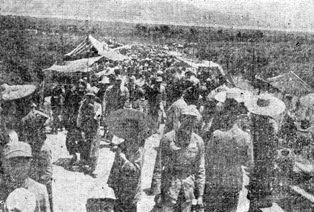 All roads lead to the fair as crowds swarm in from the territory surrounding Lake Tali. ICD enlisted men
joined the throng to see the sights.
All roads lead to the fair as crowds swarm in from the territory surrounding Lake Tali. ICD enlisted men
joined the throng to see the sights.
|
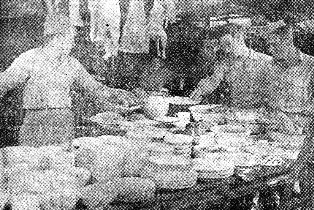 Chinese foods with exotic names and strange tastes are sampled by the American soldiers. Pass the egg fooyong,
pappy.
Chinese foods with exotic names and strange tastes are sampled by the American soldiers. Pass the egg fooyong,
pappy.
|
Military Ceremony as RC Gal Weds CO
1311 BU, India - Judy Jones, pretty American Red Cross girl, and Capt. William F. Broer, Jr., CO of the AACS detachment, were married here this week in the first military wedding in the history of the base.
In the frosty white of her fitted wedding gown the bride gave Stateside glamour to the scene before a flower-banked altar in the mission church. All guests were in uniform.
Chaplain Thomas P. Warfield performed the ceremony.
|
Karachi Teacher Maps Tenets
Of Hinduism for Occidentals
In Brief Exposition of Creed
Avowed; Man's Godhood Believed
By Prof. B. J. Vaswani
The views expressed in this article are those of the writer and do not necessarily reflect the opinion of the ICD or the Hump Express.
The Hindu religion is appropriately called "Sanatan Dharma," i.e. the Eternal Law of Life. For such a religion, as large and various as life, as old as human life on this planet, it is difficult to explain all the cardinal concepts and their many applications to individual, national and world life in one short article, but I shall attempt a bare outline.
1. The Hindu theory of creation is like that of the Christians. God sent out his breath into the primal matter and the universe came into being.
World Inner Government
2. Man, according to the Hindus, was not an abrupt, arbitrary creation but the result of a long, long evolution of life, through mineral, vegetable and animal forms. All original divine life infused in primeval matter is still in all the manifested universe and is evolving itself through countless forms. This theory of evolution was discovered by Hindu minds 5,000 years before Darwin and postulates an unending infinite evolution to higher forms even beyond the stage of supermen.
3. Just as in mundane governments of the world there is a plan and a hierarchy so there is an inner government of the world ruled by a Trinity of God, and lesser gods and goddesses to whom worship must be paid. But above all gods and goddesses is One Brahma (the Uncreated, the Unborn).
4. From this inner government of the world came all the prophets of humanity, to different nations, for different needs and at different times. Sometimes God himself reincarnates (i.e. comes as an Avatar) as animal in the animal world, as man for men to lead them to higher planes of life.
5. Man is not made in the image of God, but is God, though functioning in physical, emotional and mental vehicles. His evolution consists in gradually freeing himself from the desires of those vehicles and establishing an identity of his godhead with the Universal Self.
6. For this increasing realization, his individual life is to be guided by the system of four ashramas or stages - a. Up to 20 years tutelage. b. From 20 to 50, life of a householder, performing all his duties to his family and society. c. 50 to about 60, retiring from all earthly ties and desires, and seeking a life of meditation. d. 60 onwards a life of absolute renunciation, when he will have no home, no property, just a wanderer who seeks for no material gains, and craves for naught in this world.
Born Many Times
7. Man is not born by an arbitrary accident or chance out of nothing, and goes into nothing at death. He has been in this world many times before and will be born again and again till he gains perfection as man. This is the law of reincarnation, and this birth and rebirth is based on the law of Karma, i.e., as you sow, so shalt thou reap. Your life today is the result of your Karmas or actions in the previous life, with all its handicaps and advantages deserved by you, and your future lives also will be determined by how you behave or misbehave. There is no special grace to atone for sin, there is no eternal heaven or hell, and if there are inequities at birth and through life they are due, not to the mere whim of an irrational God, but the result of an irresistible law of Karma, and man must therefore be his own savior.
Found Replacement But Staying in India
1350 BU, China - Capt. Robert W. Barnes, Washington, D.C., finance officer at 1345 BU, has found his replacement, but he's still not going home.
That's because it's not the right kind of a replacement to make him eligible for rotation. Capt. Barnes located the man who replaced him in his civilian job. When the officer reported overseas, he was stationed at 1345 BU, India, and opened the finance office with the aid of a new chief clerk, S/Sgt. Edward Pike, Greensville, S.C.
After knowing each other for about three months, Capt. Barnes and Sgt. Pike were talking over mutual friends in Washington. They discovered that Pike was the man who took over the captain's job in 1937 when he left to enter the Army.
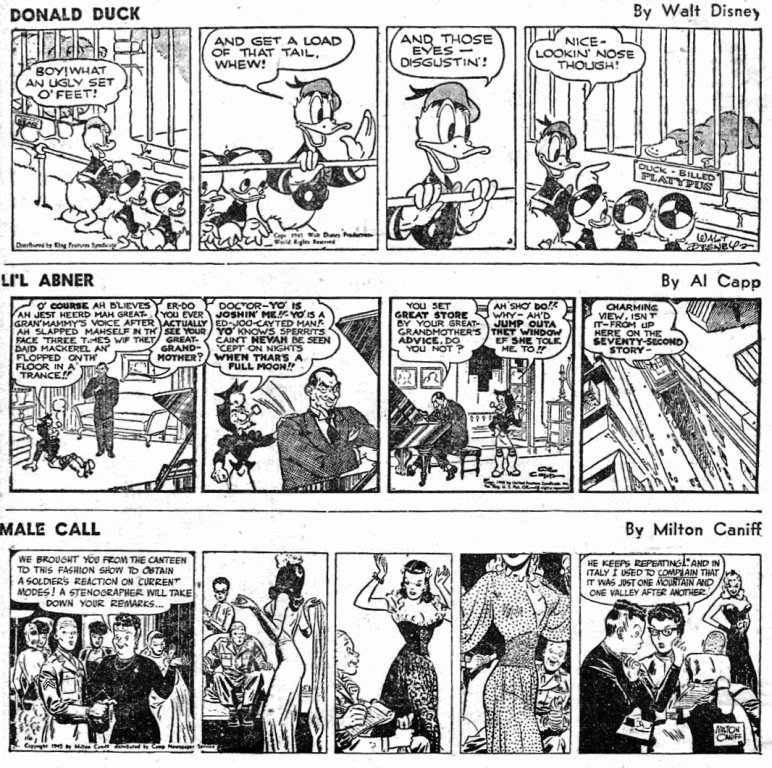
|
JEEPERS CREEPERS
By Lt. Harriet Woods, ANC Long her figure, lithe her gesture As she twines around the seat. Loose her muscles, poor her posture As she settles, lax and sweet. There are those who say you cannot Snuggle in the jeep's front seat. But I contend it's propaganda, I've seen it done in manner neat. Item - evening moon on high Item - driver, cozy lap Item - damsel, sleep most nigh Item - watch her bridge the gap. Broken backs present no terror, I view the scene with awe and fear. Honest true, she looks the fairer Twined among the gear. Ask you what about the space Such position must traverse? She ignores it - says with grace And rises later, none the worse. You or I, we couldn't do it, Not without a misplaced sine. But Genie does, and doesn't rue it, Lives to once again recline. Copyright 1945, Harriet Woods. (Lt. Harriet Woods, Army nurse, writes poetry in he spare time. She plans to submit a collection of her poems to publishers for addition to a book of verse. She is now stationed at a 1333 BU hospital.) |
Written and Produced by GIs,
Will Be Premiered This Week
'Listening Skies' Considered First-Rate Production by Reviewers
1333 BU, Assam - What promises to be one of the most spectacular, yet sincere musical productions in the history of this theater will be presented on June 5, when the premier of "Listening Skies" is given at this base.
The production, presented by Squadron "F," is an original stage show produced, written and directed by Negro personnel. It is the story of the Negro people and their music; its transition through the different periods of American history. A moving narration separates the different moods which include spirituals, songs of the old south, minstrels, blues, sweet, swing, boogie-woogie and jive.
Written By GIs
The special premiere will be given on the evening of June 5 in the squadron's dayroom to a limited number of special guests. The "Skies" was written by Cpl. Herman Gilbert and Pfc. Sullivan Wolfe, a new adaptation of the "Gilbert and Sullivan" combination. The cast includes a chorus of 40 voices and a Negro band, features Pvt. Ralph Todd, baritone from Cleveland, Ohio.
Using songs which are symbolic of their people, Gilbert and Wolfe have conveyed the feeling that only songs which come from the heart can tell of the true love of music which stirs in the hearts of the Negro people. The entire musical is presented in an enchanting and moving fashion, from the early soulful ballads to the present day rhythmic swing arrangements.
High Acclaim
Among those prominent visitors who witnessed the rehearsals was Mr. Jan Stephans, editor of one of India's largest newspapers. Stephans commented on the earnest manner in which the boys participated in the rehearsals, marveled at the scope of the show, the striking effects produced and said, "It was extraordinary, delightful; it will always remain in my memory."
Another visitor was Benny Meroff, director of the popular USO show "Funzafire." Together with his cast, he spent many hours at the rehearsals.
Burmese Girls Back with Army After Eluding Japs
1348 BU, Burma - After years of avoiding the Japs, two Burmese girls are once more working for the American Army.
The two girls, Molly Aziz and Esther Dhadum, worked for the U.S. Army in Namtu until the Japs occupied the area.
The enemy forced Molly's father to work at his old job of railroad controller. Their treatment of the population was governed by the progress of their campaign. When things got tough for the Nips they made it tougher for
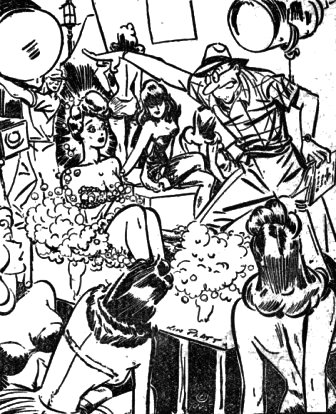 "Now I want to see some real acting . . . remember your son is in uniform, your husband is out with another woman
and you just lost your cake of soap!"
"Now I want to see some real acting . . . remember your son is in uniform, your husband is out with another woman
and you just lost your cake of soap!"
|
Molly once narrowly escaped capture by the enemy. One night a Jap soldier entered her house and at the point of a gun ordered her to headquarters. Dressed as a Shan laborer, she hid her face in an effort to conceal her identity. Before leaving she asked the Japs if she could get some water from a nearby well. Surprised at he ability to speak Japanese, the guard allowed her to go under the promise that she would return. That's one promise she never kept. Soon after, the Chinese and Americans entered the village and Molly came out of he hideout in the hills.
Molly was born in Namtu and educated in Rangoon and Maymyo. She is Anglo-Shan and speaks English, Burmese, Shan, Hindusthani and some Japanese.
Esther is Burmese and lived in Lashio. She speaks English and several local languages.
They are the first two feminine workers assigned to this base.
Composing Medic's New Tune
A Winner in Radio Contest
1328 BU, Assam - Pfc. Milton Groggins, local medic, rang the bell again last week with one of his original song compositions.
A letter from Kate D. Lawson, assistant to Major Melvyn Douglas of the EPU, informed Tunesmith Groggins that his song, "Got To Check My Rhythm" had been selected as the song of the week, and would be played on the EPU radio program, "On Stage."
This was the second time that a Groggins original has been so honored.
HUMP EXPRESS is the official newspaper of the India-China Division, Air Transport Command, APO 192, c/o Postmaster, New York, N.Y., and is published by its Public Relations office. Camp Newspaper Service and Army Newspaper Service features are used, reproduction of which is prohibited without permission of CNS and ANS, 205 East 42nd St., New York, 17, N.Y. Other material is submitted by staff members, ICD-ATC base Public Relations sections and other soldier correspondents. Printed weekly by the Hindusthan Standard, 3 Burman St., Calcutta, India, and distributed each Thursday. Passed by U.S. Press Censor for mailing.
| Military transport schedules over India for cargo, personnel and mail . . . maximum tonnage of essential war materials over the Hump . . . movement of troops and supplies in support of tactical operations in China . . . evacuation of the sick and wounded - these are the missions of ICD-ATC. |

MAY 31, 1945
Original issue of HUMP EXPRESS shared by CBI veteran Grover P. Fike
| Identical, better quality image of the photo of Martha Vickers substituted for the original. The story titled "1328 BU Personnel Earn Commendation In Pipe Movement" has been accurately reproduced, including the difference between the Base Unit numbers in the title and the dateline. |
Copyright © 2008 Carl Warren Weidenburner
TOP OF PAGE PRINT THIS PAGE ABOUT THIS PAGE E-MAIL YOUR COMMENTS
PREVIOUS ISSUE HUMP EXPRESS BASE NEXT ISSUE
| This page dedicated in memory of CBI Veteran Robert Roesky |
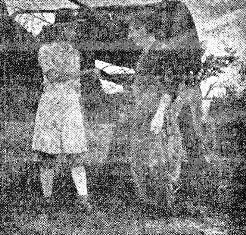 M/Sgt. Roger Bouffard saved the lives of three men last week during the tornado which struck near his base.
By acting quickly he managed to get the passengers on his weapons carrier to safety just as a large sheet of steel
roofing smashed into the truck.
M/Sgt. Roger Bouffard saved the lives of three men last week during the tornado which struck near his base.
By acting quickly he managed to get the passengers on his weapons carrier to safety just as a large sheet of steel
roofing smashed into the truck.
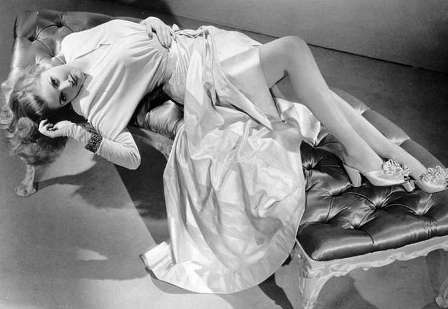 After "slipping into something more comfortable" Martha Vickers presents a picture of blonde relaxation at the
Warner Brethren's photo shop.
After "slipping into something more comfortable" Martha Vickers presents a picture of blonde relaxation at the
Warner Brethren's photo shop.
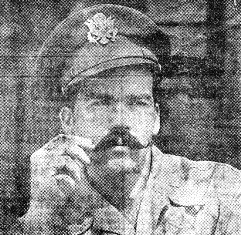 Claim to the longest and bushiest "soup-strainer" in the China wing is made by F.O. Edwin F. Phillips, 1340 BU pilot.
Winner in a moustache-growing contest with his roommate, he is nevertheless unhappy. His girl back home doesn't like it
and has written to "shave it or else!"
Claim to the longest and bushiest "soup-strainer" in the China wing is made by F.O. Edwin F. Phillips, 1340 BU pilot.
Winner in a moustache-growing contest with his roommate, he is nevertheless unhappy. His girl back home doesn't like it
and has written to "shave it or else!"
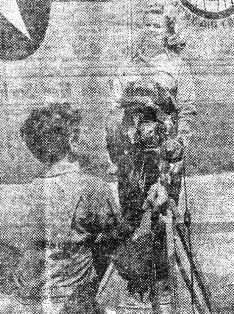 An ICD flight nurse, Lt. Norma P. Apelian, smiles for the cameraman, Lt. Charles Hockman, during the recent filming
of the division motion picture. Now being processed in the U.S., the pictorial history is to be used for indoctrination
of new troops at Karachi.
An ICD flight nurse, Lt. Norma P. Apelian, smiles for the cameraman, Lt. Charles Hockman, during the recent filming
of the division motion picture. Now being processed in the U.S., the pictorial history is to be used for indoctrination
of new troops at Karachi.
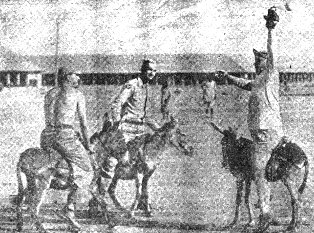 In the donkey baseball game, where even donkeys forgot their stoicism, M/Sgt. Robert Roesky and his donkey reach
second base in safety as Maj. Albert Kohler, second baseman, misses the catch. Capt. George Vest looks on.
In the donkey baseball game, where even donkeys forgot their stoicism, M/Sgt. Robert Roesky and his donkey reach
second base in safety as Maj. Albert Kohler, second baseman, misses the catch. Capt. George Vest looks on.
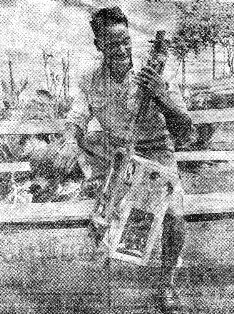 Pfc. Eugar Marshall, 1332 BU, strums a tune on this guitar-like music box. He will take the contraption with
him on his tour of ICD bases. He fashioned it from ration boxes, scrap wood and whisky bottle corks. Marshall is also
a tap dancer.
Pfc. Eugar Marshall, 1332 BU, strums a tune on this guitar-like music box. He will take the contraption with
him on his tour of ICD bases. He fashioned it from ration boxes, scrap wood and whisky bottle corks. Marshall is also
a tap dancer.
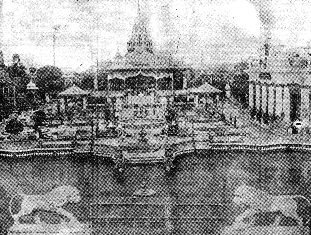 Like a fairyland with all its graceful and mysterious doo-dads, the Jain Temple in Calcutta draws crowds of GI
visitors who come to admire the fantasies of its oriental atmosphere.
Like a fairyland with all its graceful and mysterious doo-dads, the Jain Temple in Calcutta draws crowds of GI
visitors who come to admire the fantasies of its oriental atmosphere.
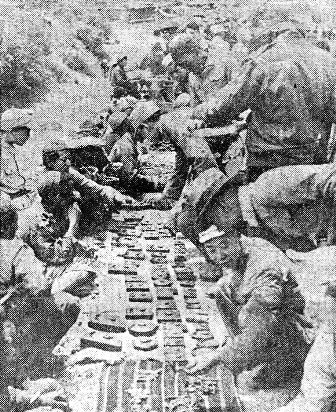 GIs buy trinkets by the hundreds. Chinese and Tibetan traders drive hard bargains with free-spending ICD visitors
but it's all part of a friendly custom. The traders feel insulted if one pays the first-named price.
GIs buy trinkets by the hundreds. Chinese and Tibetan traders drive hard bargains with free-spending ICD visitors
but it's all part of a friendly custom. The traders feel insulted if one pays the first-named price.
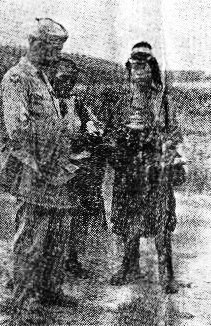 Using a strange mixture of pidgin English and sign language an enlisted man wages a friendly price war for Tibetan
incense burner.
Using a strange mixture of pidgin English and sign language an enlisted man wages a friendly price war for Tibetan
incense burner.
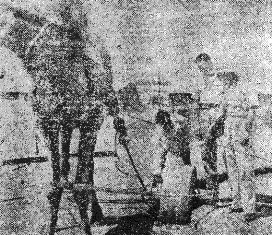 Life could be so interesting, but not for this old camel. He just goes around, always in a circle. Maybe he'd feel
better if he knew he were mixing mortar which will be used for building the new motor pool at 1307 BU... then again,
maybe he wouldn't.
Life could be so interesting, but not for this old camel. He just goes around, always in a circle. Maybe he'd feel
better if he knew he were mixing mortar which will be used for building the new motor pool at 1307 BU... then again,
maybe he wouldn't.